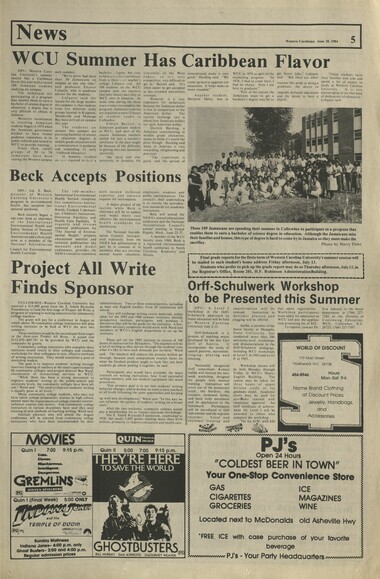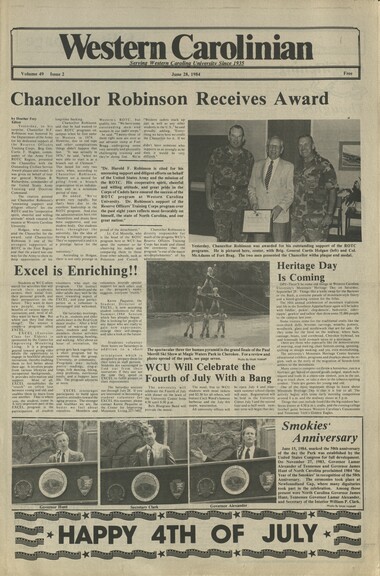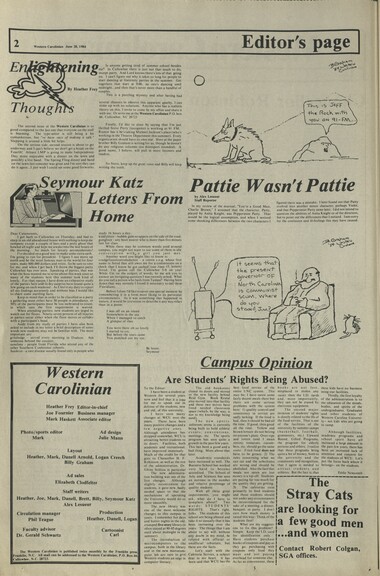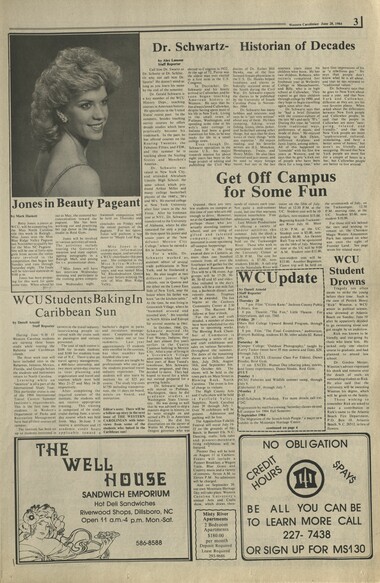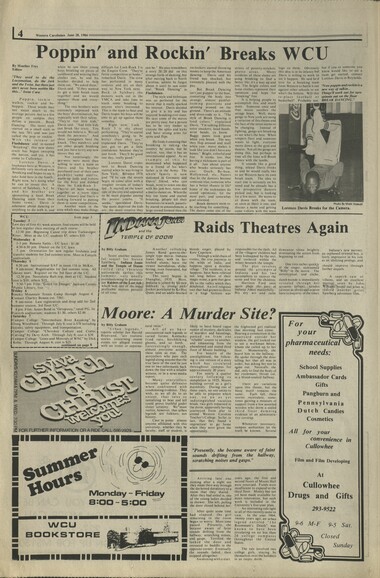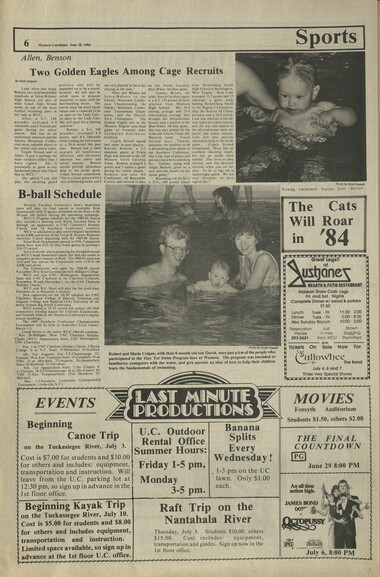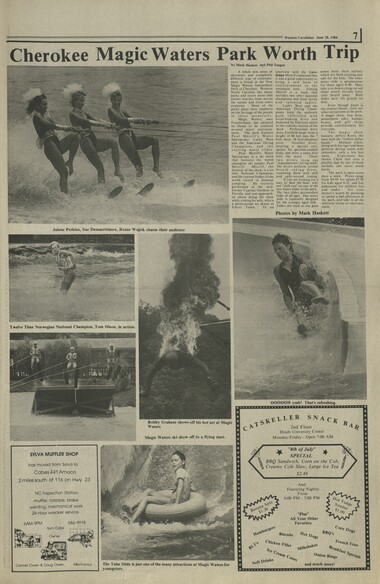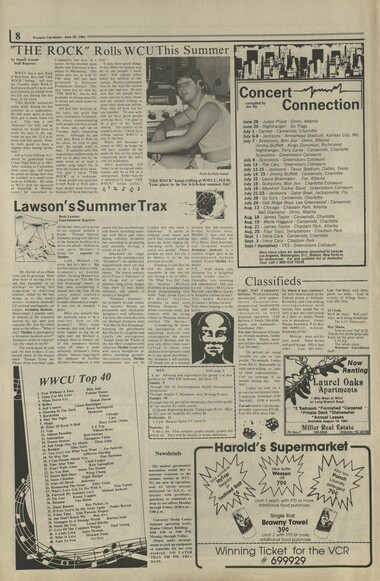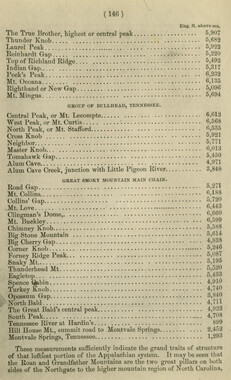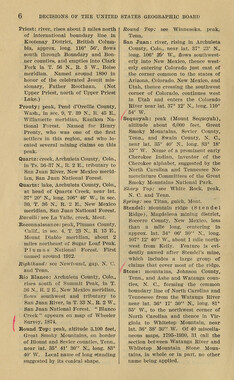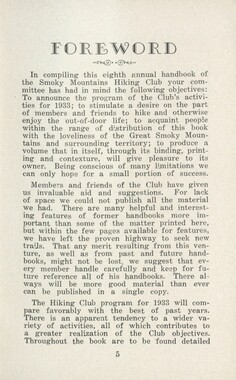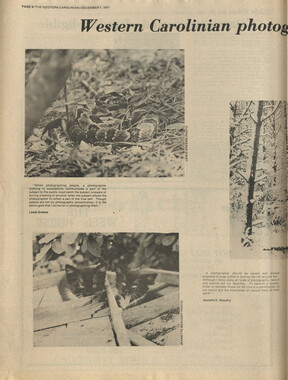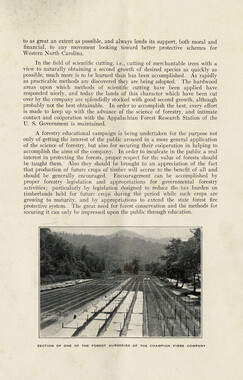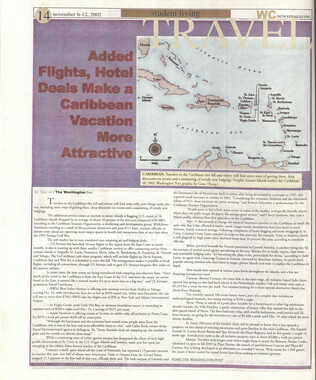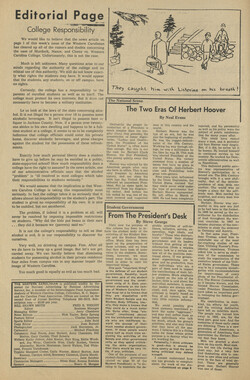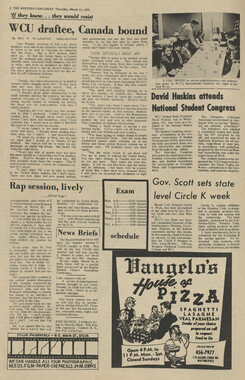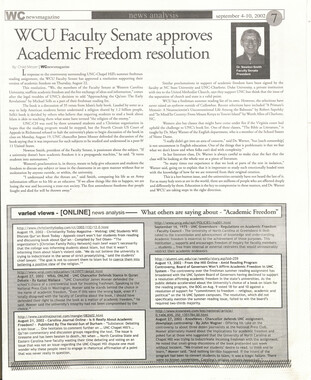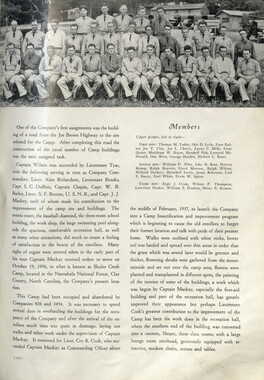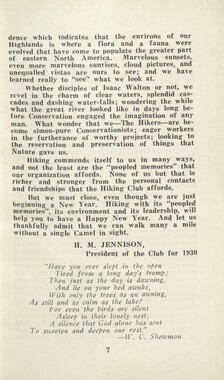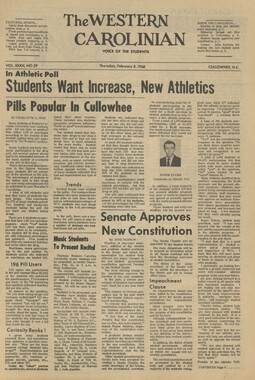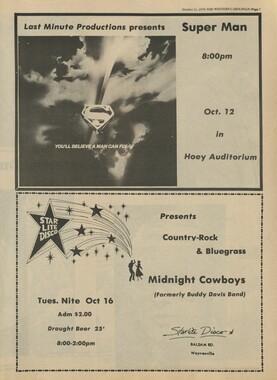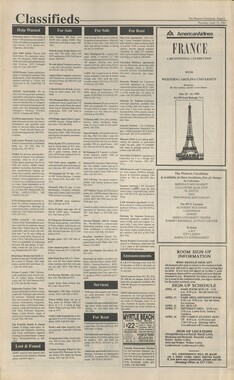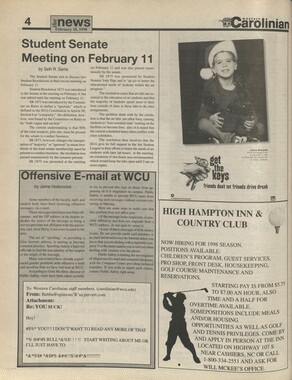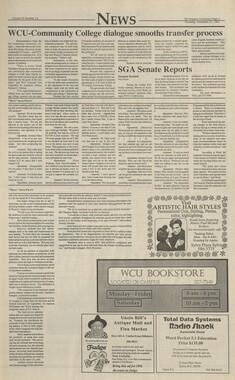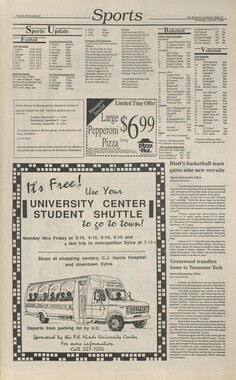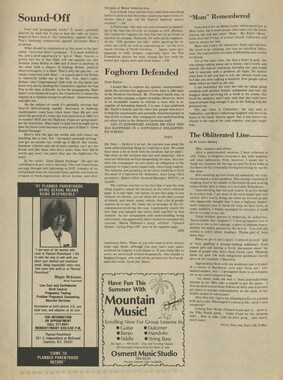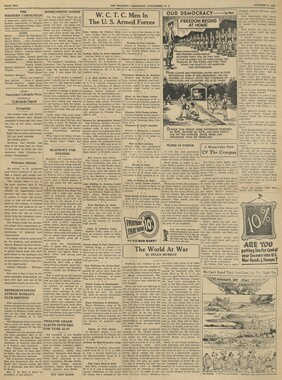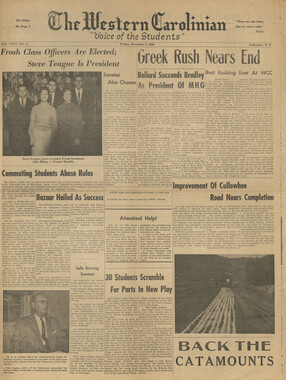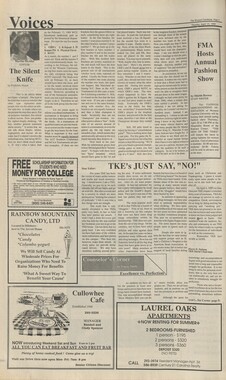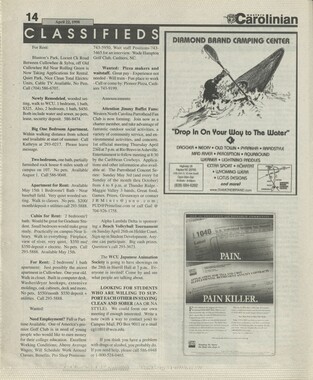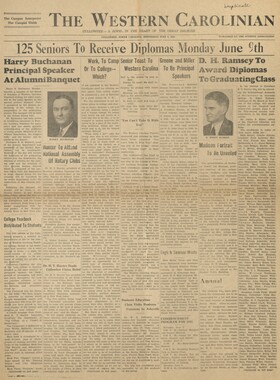Western Carolina University (20)
View all
- Canton Champion Fibre Company (2308)
- Cherokee Traditions (293)
- Civil War in Southern Appalachia (165)
- Craft Revival (1942)
- Great Smoky Mountains - A Park for America (2767)
- Highlights from Western Carolina University (430)
- Horace Kephart (941)
- Journeys Through Jackson (154)
- LGBTQIA+ Archive of Jackson County (26)
- Oral Histories of Western North Carolina (314)
- Picturing Appalachia (6772)
- Stories of Mountain Folk (413)
- Travel Western North Carolina (160)
- Western Carolina University Fine Art Museum Vitreograph Collection (129)
- Western Carolina University Herbarium (92)
- Western Carolina University: Making Memories (708)
- Western Carolina University Publications (2283)
- Western Carolina University Restricted Electronic Theses and Dissertations (146)
- Western North Carolina Regional Maps (71)
- World War II in Southern Appalachia (131)
University of North Carolina Asheville (6)
View all
- Allanstand Cottage Industries (62)
- Appalachian National Park Association (53)
- Bennett, Kelly, 1890-1974 (1388)
- Berry, Walter (76)
- Brasstown Carvers (40)
- Carver, George Washington, 1864?-1943 (26)
- Cathey, Joseph, 1803-1874 (1)
- Champion Fibre Company (233)
- Champion Paper and Fibre Company (297)
- Cherokee Indian Fair Association (16)
- Cherokee Language Program (22)
- Crowe, Amanda (40)
- Edmonston, Thomas Benton, 1842-1907 (7)
- Ensley, A. L. (Abraham Lincoln), 1865-1948 (275)
- Fromer, Irving Rhodes, 1913-1994 (70)
- George Butz (BFS 1907) (46)
- Goodrich, Frances Louisa (120)
- Grant, George Alexander, 1891-1964 (96)
- Heard, Marian Gladys (60)
- Kephart, Calvin, 1883-1969 (15)
- Kephart, Horace, 1862-1931 (313)
- Kephart, Laura, 1862-1954 (39)
- Laney, Gideon Thomas, 1889-1976 (439)
- Masa, George, 1881-1933 (61)
- McElhinney, William Julian, 1896-1953 (44)
- Niggli, Josephina, 1910-1983 (10)
- North Carolina Park Commission (105)
- Osborne, Kezia Stradley (9)
- Owens, Samuel Robert, 1918-1995 (11)
- Penland Weavers and Potters (36)
- Roberts, Vivienne (15)
- Roth, Albert, 1890-1974 (142)
- Schenck, Carl Alwin, 1868-1955 (1)
- Sherrill's Photography Studio (2565)
- Southern Highland Handicraft Guild (127)
- Southern Highlanders, Inc. (71)
- Stalcup, Jesse Bryson (46)
- Stearns, I. K. (213)
- Thompson, James Edward, 1880-1976 (226)
- United States. Indian Arts and Crafts Board (130)
- USFS (683)
- Vance, Zebulon Baird, 1830-1894 (1)
- Weaver, Zebulon, 1872-1948 (58)
- Western Carolina College (230)
- Western Carolina Teachers College (282)
- Western Carolina University (1794)
- Western Carolina University. Mountain Heritage Center (18)
- Whitman, Walt, 1819-1892 (10)
- Wilburn, Hiram Coleman, 1880-1967 (73)
- Williams, Isadora (3)
- Cain, Doreyl Ammons (0)
- Crittenden, Lorraine (0)
- Rhodes, Judy (0)
- Smith, Edward Clark (0)
- Appalachian Region, Southern (2399)
- Asheville (N.C.) (1917)
- Avery County (N.C.) (26)
- Blount County (Tenn.) (161)
- Buncombe County (N.C.) (1671)
- Cherokee County (N.C.) (283)
- Clay County (N.C.) (555)
- Graham County (N.C.) (233)
- Great Smoky Mountains National Park (N.C. and Tenn.) (510)
- Haywood County (N.C.) (3522)
- Henderson County (N.C.) (70)
- Jackson County (N.C.) (4692)
- Knox County (Tenn.) (25)
- Knoxville (Tenn.) (12)
- Lake Santeetlah (N.C.) (10)
- Macon County (N.C.) (420)
- Madison County (N.C.) (211)
- McDowell County (N.C.) (39)
- Mitchell County (N.C.) (132)
- Polk County (N.C.) (35)
- Qualla Boundary (981)
- Rutherford County (N.C.) (76)
- Swain County (N.C.) (2113)
- Transylvania County (N.C.) (247)
- Watauga County (N.C.) (12)
- Waynesville (N.C.) (73)
- Yancey County (N.C.) (72)
- Aerial Photographs (3)
- Aerial Views (60)
- Albums (books) (4)
- Articles (1)
- Artifacts (object Genre) (228)
- Bibliographies (1)
- Biography (general Genre) (2)
- Cards (information Artifacts) (38)
- Clippings (information Artifacts) (191)
- Crafts (art Genres) (622)
- Depictions (visual Works) (21)
- Design Drawings (1)
- Drawings (visual Works) (184)
- Envelopes (73)
- Facsimiles (reproductions) (1)
- Fiction (general Genre) (4)
- Financial Records (12)
- Fliers (printed Matter) (67)
- Glass Plate Negatives (381)
- Guidebooks (2)
- Internegatives (10)
- Interviews (812)
- Land Surveys (102)
- Letters (correspondence) (1013)
- Manuscripts (documents) (619)
- Maps (documents) (177)
- Memorandums (25)
- Minutes (administrative Records) (59)
- Negatives (photographs) (5835)
- Newsletters (1285)
- Newspapers (2)
- Occupation Currency (1)
- Paintings (visual Works) (1)
- Pen And Ink Drawings (1)
- Periodicals (193)
- Personal Narratives (10)
- Photographs (12976)
- Plans (maps) (1)
- Poetry (7)
- Portraits (1960)
- Postcards (329)
- Programs (documents) (151)
- Publications (documents) (2237)
- Questionnaires (65)
- Scrapbooks (282)
- Sheet Music (2)
- Slides (photographs) (402)
- Songs (musical Compositions) (2)
- Sound Recordings (796)
- Specimens (92)
- Speeches (documents) (15)
- Tintypes (photographs) (8)
- Transcripts (322)
- Video Recordings (physical Artifacts) (23)
- Vitreographs (129)
- Text Messages (0)
- A.L. Ensley Collection (275)
- Appalachian Industrial School Records (7)
- Appalachian National Park Association Records (336)
- Axley-Meroney Collection (2)
- Bayard Wootten Photograph Collection (20)
- Bethel Rural Community Organization Collection (7)
- Blumer Collection (5)
- C.W. Slagle Collection (20)
- Canton Area Historical Museum (2110)
- Carlos C. Campbell Collection (282)
- Cataloochee History Project (65)
- Cherokee Studies Collection (4)
- Daisy Dame Photograph Album (5)
- Daniel Boone VI Collection (1)
- Doris Ulmann Photograph Collection (112)
- Elizabeth H. Lasley Collection (1)
- Elizabeth Woolworth Szold Fleharty Collection (4)
- Frank Fry Collection (95)
- George Masa Collection (173)
- Gideon Laney Collection (452)
- Hazel Scarborough Collection (2)
- Hiram C. Wilburn Papers (28)
- Historic Photographs Collection (236)
- Horace Kephart Collection (861)
- Humbard Collection (33)
- Hunter and Weaver Families Collection (1)
- I. D. Blumenthal Collection (4)
- Isadora Williams Collection (4)
- Jesse Bryson Stalcup Collection (47)
- Jim Thompson Collection (224)
- John B. Battle Collection (7)
- John C. Campbell Folk School Records (80)
- John Parris Collection (6)
- Judaculla Rock project (2)
- Kelly Bennett Collection (1407)
- Love Family Papers (11)
- Major Wiley Parris Civil War Letters (3)
- Map Collection (12)
- McFee-Misemer Civil War Letters (34)
- Mountain Heritage Center Collection (4)
- Norburn - Robertson - Thomson Families Collection (44)
- Pauline Hood Collection (7)
- Pre-Guild Collection (2)
- Qualla Arts and Crafts Mutual Collection (12)
- R.A. Romanes Collection (681)
- Rosser H. Taylor Collection (1)
- Samuel Robert Owens Collection (94)
- Sara Madison Collection (144)
- Sherrill Studio Photo Collection (2558)
- Smoky Mountains Hiking Club Collection (616)
- Stories of Mountain Folk - Radio Programs (374)
- The Reporter, Western Carolina University (510)
- Venoy and Elizabeth Reed Collection (16)
- WCU Gender and Sexuality Oral History Project (32)
- WCU Mountain Heritage Center Oral Histories (25)
- WCU Oral History Collection - Mountain People, Mountain Lives (71)
- WCU Students Newspapers Collection (1744)
- Western North Carolina Tomorrow Black Oral History Project (69)
- William Williams Stringfield Collection (2)
- Zebulon Weaver Collection (109)
- African Americans (390)
- Appalachian Trail (35)
- Artisans (521)
- Cherokee art (84)
- Cherokee artists -- North Carolina (10)
- Cherokee language (21)
- Cherokee pottery (101)
- Cherokee women (208)
- Church buildings (167)
- Civilian Conservation Corps (U.S.) (110)
- College student newspapers and periodicals (1830)
- Dams (103)
- Dance (1023)
- Education (222)
- Floods (61)
- Folk music (1015)
- Forced removal, 1813-1903 (2)
- Forest conservation (220)
- Forests and forestry (1058)
- Gender nonconformity (4)
- Great Smoky Mountains National Park (N.C. and Tenn.) (181)
- Hunting (38)
- Landscape photography (10)
- Logging (103)
- Maps (84)
- Mines and mineral resources (8)
- North Carolina -- Maps (18)
- Paper industry (38)
- Postcards (255)
- Pottery (135)
- Railroad trains (71)
- Rural electrification -- North Carolina, Western (3)
- School integration -- Southern States (2)
- Segregation -- North Carolina, Western (5)
- Slavery (5)
- Sports (452)
- Storytelling (245)
- Waterfalls -- Great Smoky Mountains (N.C. and Tenn.) (66)
- Weaving -- Appalachian Region, Southern (280)
- Wood-carving -- Appalachian Region, Southern (328)
- World War, 1939-1945 (173)
Western Carolinian Volume 49 Number 02
Item
Item’s are ‘child’ level descriptions to ‘parent’ objects, (e.g. one page of a whole book).
-
-
News Western Carolinian June 28, 1984 WCU Summer Has Caribbean Flavor OP1-- Western Carolina University's summer session has a Caribbean flavor this year with a record 109 Jamaican students studying on campus. The Jamaicans are participating in a program that enables them to earn a bachelor of science degree in education, a degree that is very difficult to obtain in Jamaica. Western's involvement in training Jamaican students began in 1975 when the Jamaican government decided to have formal guidance counselors in its public schools and turned to WCU to provide training. Since then, small groups of 20 to 30 Jamaicans have been visiting the Western campus each summer. "We've never had more than 30 Jamaicans on campus at any one time." said professor Eleanor Lofquist. who is academic- adviser for the students. I.ofq uist said the reason for the large number this summer is that students from five different study groups located in Kingston. Mandeville and Montego Bay have arrived on campus this year. Ihe students on campus this summer are pursuing bachelor of science in education degrees in middle grade education with a concentration in guidance and counseling or early hildhood education In Jamaica, teachers arc iii'i required to have a bachcloi degree, but only to have a teacher's certificate from a thrcc-ycai teacher's college. Lolquisi said. All 109 students on thc WCU campus now are teachers that take classes part time at WCU sites in Jamaica. At some time during the three years it takes to complete the program. Jamaican students are required to earn 12 hours of resident credit in Cullowhee, Ethlyn Barrett, a Jamaican graduate student at WCU. said part of the reason Jamaican teachers settled lor just a teacher's certificate in the past might be because ot the difficulty in getting into one Jamaican university "We have just one university in Jamaica, the University of the West Indies, so it's very competitive, very difficult to get in," Barrett said. "It's often easier to get accepted at less crowded universities overseas. However, it is very expensive for Jamaicans because the Jamaican dollar is low in comparison to the American dollar. The current exchange rate is about iour Jamaican dollars for each American dollar. Derrick Harding, a Jamaican concentrating in middle grade education, seems to think it's worth the price though. Harding said studs in America is very, rewarding, enlightening and practical. " 1 he experience is good, and thc period of concentrated study is very good." Harding said. "We come up here to upgrade our education. It helps make us more rounded." Another student. Marjorie Daley, was at Beck Accepts Positions OPI-- Joe. E. Beck, director of Western Carolina University's program in environmental health, has accepted two national positions. Beck recently began a one-year term as chairman of the I nst it utional Environmental Health and Safety Section of National Environmental Health Association and a three-year term as a member of the National Accreditation Council for Environmental Health Curricula. The 160-member Institutional Environmental Health Section comprises five committees—Institutional Environmental Health. Campus Communities. Children's Institutions, Detention Facilities and Health Care Facilities, lt requests and reviews technical publications for "The Journal of Environmental Heajth," prepares educational material and technical publications like manuals and model ordinances, provides the NEH A executive committee with needed technical expertise and answers requests for inlormation. A major project of the section while Beck is chairman will be to update and make more cost effective the environmental health standards for institutions. The National Accreditation Council, incorporated separately from thc NEH A but administered in part by it. consists of 16 members who are environmental health educators. employees, students and public representatives. The council's chief undertaking is to rewrite the accreditation standards for academic institutions. Beck will attend the NEH A's annual educational conference and the National Accreditation Council's annual meeting in Grand Rapids, Mich.. June 22-27. A member of the WCU faculty since 1980. Beck is a registered environmental health sanitarian in North Carolina. Kentucky and Illinois. Project All Write Finds Sponsor CULLOWHEE-Western Carolina University has received a $15,000 grant from the Z. Smith Reynolds Foundation to fund the first stage of Project All Write, a program of training in writing instruction for community college teachers. The grant will pay for a conferenct in August at which about 50 community college instructors will plan writing institutes to be held at WCU the next two summers. These institutes would be the second and third stages in the three-year Project All Write. It would cost $112.670—$45,791 to be provided by WCU and the remainder by grants. Community college instructors who complete these institutes would return to their colleges and conduct workshops for their colleagues in new, effective methods of writing instruction. They would constitute a pool of workshop leaders. The goal is to improve students' writing through inservice training of teachers at the state's approximately 60 community colleges, said project director Ben Ward, coordinator of instructional services at WCU. "While there has been a strong movement to improve students' writing at the public-school and university levels, the community colleges have been left out." Ward said. "The need to improve students' writing is equally great at all levels." Many community college students, who may not have taken college preparatorv courses in high school, cannot meet the requirements of college-transfer courses, technical courses and careers. And community college instructors in various disciplines have said they need training in new methods of teaching writing. Ward said. Institute planners who will attend the August conference will be selected from community college instructors who have been recommended by their administrators. Two or three representatives, including at least one English teacher, from 20 institutions will attend. They will exchange writing course materials, solicit ideas for the 1985 and 1986 summer institutes, identify prospective institute participants and produce a document that will be the guide for the institutes. A five- member advisory committee would work with Ward and members of WCU's English department to set up the institutes. Plans call for the 1985 institute to consist of 100 hours of instruction for 30 teachers. "The teachers will do a lot of writing so they can see through the students' eyes what it's like to have such demands put on them." Ward said. The teachers will analyze the process writers go through, because most composition courses focus on what the finished product ought to look like, not how students go about putting it together, he said. Participants also would have available the latest research on writing instruction, hear from successful writing teachers, and use modern equipment like word processors. "Our primary goal is to see that students' writing behavior changes, and to do that we need to have teachers at all levels following the same approaches and keeping up with new developments." Ward said. "In this way we can influence the quality of students' writing on a broad scale." After the two institutes, commuity colleges would pay a membership fee to finance statewide workshops. The Z. Smith Reynolds Foundation, established in 1936. has made 1.692 grants totaling more than $116 million, primarily to improve education and health care. MOVIES QUINSST Quin I 7:00 9:15 p.m Cute. Cltnrw. Quin II 5:00 7:00 9:15 p.m. Intelligent GSEMUNS m STF.VT.N SPIF.LBF.R Quin I (Final Week) 5:00 ONLY and the Ll* cr- uccm FPJ«; Sunday Matinees Indiana Jones- 4:00 p.m. only Ghost Busters- 2:00 and 4:00 p.m. Regular admission prices GHOSTBUSTERS, DILL MUKRAY DAN AYKROYD SIGOURNEY WEAVER WCU in I976as part of the counseling program. "In I976. I had to come here; I had no choice Now l am here to graduate." "Part of the reason the Jamaicans want to get a bachelor's degree may be to get better jobs." Lofquist said. "But there are other reasons like pride in being a graduate, the desire to upgrade personal education and the desire to have a degree. These students leave their families and jobs and spend a lot ol money to study at Western Carolina University. It is very encouraging to see that kind of dedication to education." Lofquist said. These 109 Jamaicans are spending their summer in Cullowhee to participate in a program that enables them to earn a bachelor of science degree in education. Although the Jamaicans miss their families and homes, this type of degree is hard to come by in Jamaica so they must make the sacrifice. Photo by Harry Duke Final grade reports for the firste term of Western Carolina U niversity's summer session will I be mailed to each student's home address Friday afternoon, July 13. Students who prefer to pick up the grade report may do so Thursday afternoon, July 12, in j the Registrar's Office, Room 201, H.F. Robinson AdministrationBuilding. Orff-Schulwerk Workshop to be Presented this Summer due upon registration. Eva Adcock in the music Workshop participants department at (704) 227- must apply for admission to 7242 or the Division of WCU and pay the applica- Continuing Education, tion processing fee of $15. WCU. Cullowhee. N.C. To register, contact Dr. 28723, (704) 227-7397. OPI- A Level I workshop in the Orff- Schulwerk approach to music education will be held at Western Carolina University July 2-13. Orff-Schuwerk is a process of teaching music developed by the late Carl Orff of Austria. It incorporates the study of speech patterns, movement, singing, playing and listening. Nationally recognized Orff consultant Konnie Saliba will instruct the two- week workshop, designed for people with musical training. Instruction will cover use of the pentatonic scale, the bordun, the ostinato, elemental forms, and basic body movement and its application to the Schulwerk. Participants will be introduced to Orff instruments and the soprano recorder. Vocal and rhythmic training and improvisation will be stressed. Instruction in dulcimer playing and clogging will be offered. Saliba, a member of the music faculty at Memphis State University, has conducted more than 300 university-level workshops and demonstrations in the Orff-Schulwerk pedagogy, including WCU workshops at Level 1 in 1982 and Level II in 1983. Workshop classes will be held Monday through Friday in WCU's Music- English Building. The course may be taken for three hours of upper division credit or for graduate credit. Academic credit may be used for certificate renewal with employers' approval. An Orff certificate of achievement for Level I will be awarded to those who complete the workshop. The fee $150. with $50 119 Main Street Hazel wood, N.C. 28738 456-8946 Hours Mon.-Sat. 9-6 Name Brand Clothing at Discount Prices. Jewelry, Handbags, and v.* PG Open 24 Hours "COLDEST BEER IN TOWN" Your One-Stop Convenience Store GAS CIGARETTES GROCERIES ICE MAGAZINES WINE Located next to McDonalds old Asheville Hwy 'FREE. ICE with case purchase of your favorite beverage PJ's - Your Party Headauarters
Object
Object’s are ‘parent’ level descriptions to ‘children’ items, (e.g. a book with pages).
-
The Western Carolinian is Western Carolina University's student-run newspaper. The paper was published as the Cullowhee Yodel from 1924 to 1931 before changing its name to The Western Carolinian in 1933.
-
